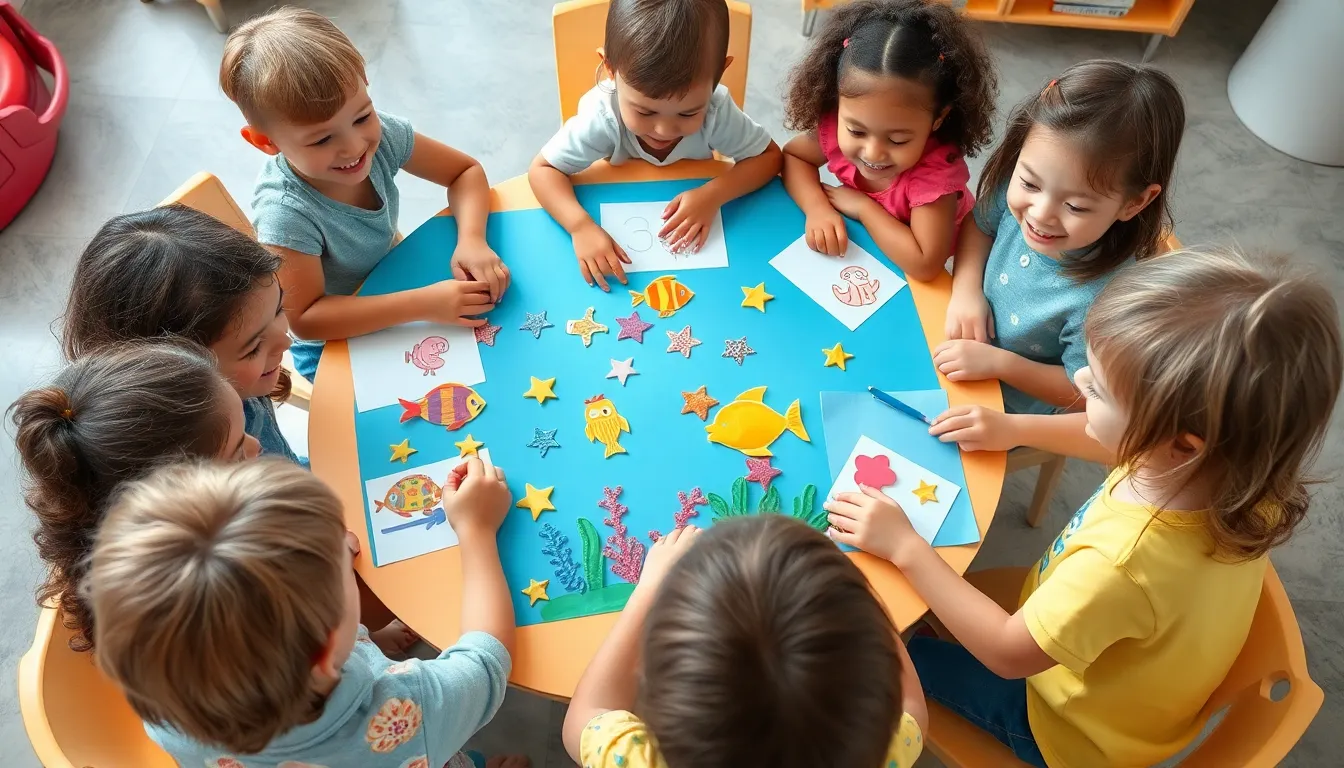Table of Contents
ToggleChoosing the right preschool theme can transform a mundane classroom into a vibrant learning oasis. Imagine tiny tots diving into the ocean, exploring outer space, or becoming little chefs—all while developing crucial skills. Preschool themes aren’t just fun; they’re the secret sauce to ignite curiosity and foster creativity in young minds.
Overview of Preschool Themes
Selecting appropriate preschool themes enriches the learning experience. Engaging topics promote active participation and stimulate children’s imaginations. Common themes include ocean exploration, space adventures, and culinary activities. Each theme serves as a gateway to new knowledge and skills.
Ocean exploration immerses preschoolers in the wonders of marine life. Children learn about different sea creatures and their habitats through interactive activities. Space adventures encourage them to think about the universe, exploring planets and stars through storytelling and crafts. Culinary activities enhance sensory experiences as kids discover food preparation and healthy eating.
Teachers can tailor themes to align with educational goals. Incorporating aspects of science, art, literature, and physical education ensures a well-rounded approach. Each theme provides various opportunities for hands-on learning and collaborative play, strengthening social skills and teamwork.
Utilizing seasonal themes, such as holidays or nature changes, keeps the curriculum fresh and relevant. Activities can include crafting decorations or exploring winter and summer ecosystems. These timely themes foster connection with the environment and cultural diversity.
Overall, preschool themes play a crucial role in creating engaging and dynamic learning environments. They foster curiosity, creativity, and a love for learning among young children. Integrating different thematic approaches can lead to a more vibrant and effective educational experience.
Importance of Preschool Themes

Preschool themes hold significant importance in establishing an engaging learning environment. They not only captivate children’s attention but also play a pivotal role in their early development.
Cognitive Development
Cognitive development benefits greatly from themed learning. Engaging themes encourage critical thinking and problem-solving through hands-on activities. Ocean exploration allows children to learn about marine life while sparking curiosity about underwater ecosystems. In a space adventure theme, children can explore planets and learn about gravity and motion. Culinary activities promote concepts of measurement and sequencing, enhancing math skills. Themes serve as dynamic tools that integrate various subjects and foster comprehension, laying a strong foundation for future learning.
Social Skills Development
Social skills development occurs naturally within themed activities. Themes create interactive opportunities, facilitating cooperation and teamwork. During ocean exploration, children might work together to create a reef ecosystem display. Collaborative projects, such as building a rocket during space week, encourage communication and negotiation. In culinary-themed settings, children share responsibilities in food preparation, promoting sharing and turn-taking. These interactions cultivate empathy and develop strong social bonds, essential for fostering relationships in broader contexts.
Popular Preschool Themes
Engaging preschool themes captivate young minds, making learning both fun and meaningful. Here are several popular themes that enhance the educational experience.
Animals and Nature
Animals and nature themes immerse preschoolers in the wonders of the natural world. Children explore different habitats, from jungles to deserts, learning about diverse species and ecosystems. Activities such as nature walks and animal crafts foster awareness of wildlife. Teachers can incorporate stories about animals, creating connections with empathy and conservation. This theme also promotes sensory experiences through outdoor exploration, enhancing curiosity about the environment.
Seasons and Weather
Seasons and weather themes introduce preschoolers to the changing world around them. Children investigate seasonal changes, such as blooming flowers in spring and falling leaves in autumn. Hands-on activities, like creating weather charts or seasonal crafts, engage young learners actively. This theme provides opportunities for discussions about appropriate clothing and seasonal activities, promoting awareness of daily weather patterns. Engaging stories about seasonal adventures further enrich the learning experience.
Community Helpers
Community helpers themes help children understand the roles of various professionals. Kids learn about firefighters, doctors, and teachers through engaging storytelling and role-playing activities. They can invite community members for discussions, promoting real-life connections. Activities such as creating thank-you cards for local heroes foster gratitude and community awareness. This theme emphasizes teamwork and communication, essential skills for social development.
Space and Planets
Space and planets themes spark curiosity about the universe. Preschoolers can explore the solar system, learning about planets, stars, and space travel. Hands-on experiences, such as creating models of planets and space crafts, encourage creativity. Discussions about astronauts and rockets promote imaginative thinking and problem-solving. This theme also allows children to ask questions about the universe, fostering critical thinking.
Transportation
Transportation themes familiarize preschoolers with various modes of travel. Children can explore cars, planes, and trains through interactive play and practical activities. Creating models or participating in a themed parade enhances engagement and learning. Discussions on safety while traveling establish awareness of rules and responsibilities. This theme supports an understanding of geography and promotes teamwork during collaborative projects, such as building a city or a vehicle.
Implementing Preschool Themes
Implementing preschool themes involves a range of engaging activities to enhance learning experiences. Teachers use these themes as the framework for planning various educational activities.
Classroom Activities
Classroom activities ignite curiosity and promote hands-on learning. Children might explore ocean-themed sensory bins filled with sand and sea creatures. Every child can participate in collaborative projects, like building a rocket out of cardboard boxes for space adventures. During nature themes, gardening activities encourage exploration and stewardship. Creative dress-up stations can also enhance themes, allowing children to immerse themselves in different roles. Diverse themes facilitate play-based learning, ensuring that children develop essential skills while having fun.
Storytime and Literature
Storytime sessions revolve around theme-related books, enriching vocabulary and comprehension. Teachers select stories that align with the current theme, such as “The Very Hungry Caterpillar” during an animals and nature theme. Each story sparks discussions about characters and settings. Engaging with illustrations helps preschoolers visualize concepts better. Incorporating puppets or props enhances storytelling, making it interactive and memorable. Responding to questions encourages critical thinking and fuels imagination, reinforcing themes further.
Art and Crafts
Creative art and craft projects complement preschool themes beautifully. Children participate in hands-on projects, such as creating space-themed murals filled with planets and stars. Ocean-themed crafts might involve making fish from recycled materials or painting a large ocean scene with different textures. Seasonal themes offer opportunities for nature crafts, such as leaf rubbings or snowflake cutouts. Displaying finished artwork in the classroom reinforces pride and ownership of their work. These artistic experiences nurture creativity while solidifying understanding of various concepts.
Preschool themes play a pivotal role in shaping a child’s educational journey. By creating an engaging and dynamic learning environment, these themes spark curiosity and fuel creativity. They provide opportunities for hands-on exploration and foster essential social skills through collaborative activities.
As teachers implement various themes, they not only align with educational goals but also enrich children’s experiences by connecting them to the world around them. From ocean exploration to space adventures, each theme serves as a unique gateway to knowledge and growth.
Ultimately, embracing well-rounded preschool themes cultivates a love for learning that lasts a lifetime.




